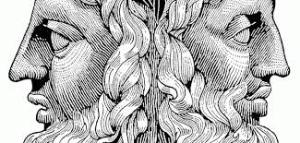
The Janus-Faced Covenant Breaker
“In fact the ‘free man’ of modern non-Christian thought is Janus-faced. He turns one way and would seem to be nothing but an irrationalist. He talks about the ‘fact’ of freedom. He even makes a pretence of being hotly opposed to the rationalist. With Kierkegaard he will boldly assert that what cannot happen according to logic has happened in fact. Then he turns the other way and would seem to be nothing but a rationalist. Surely, he says, the ‘rational man’ will accept nothing but what has intelligible meaning for him in accord with the law of contradiction. There must be coherence in experience. It is meaningless to talk about the ‘entirely single thing.’ But both in his irrationalist and in his rationalist features, the would-be autonomous man is seeking to defend his ultimacy against the claims of the Christian religion. If he is right as an irrationalist then he is not a creature of God. If he were a creature of God, he would be subject to the law of God. He would thus be ‘rationally related’ to God. He would know that he was a creature of God and that he should obey the law of God. If he is right as a rationalist, then too he is not a creature of God. The law that he then thinks of as above him, he also thinks of as above God; God and he are, for him, subject to a common law. If he were a creature of God, he would grant that what God has determined, and only that, is possible. He would then subject his logical manipulation of ‘reality’ to the revelation of God.
It is this Janus-faced covenant-breaker, then, who must be won for the gospel. It is he who walks the streets of New York and London. And no one but he does. All men are sinners; all are interested in suppressing the fact of their creaturehood. The irrationalist and rationalist have become friends in the face of their common foe. And this common foe is historic Christianity
The implication of all this for Christian apologetics is plain. There can be no appeasement between those who presuppose in all their thought the sovereign God and those who presuppose in all their thought the would-be sovereign man. There can be no other point of contact between them than that of head-on collision. The root of both irrationalism and rationalism is the idea of the ultimacy of man. If this root is not taken out, it will do little good to trim off some of the wildest offshoots of irrationalism with the help of rationalism, or to trim off some of the wildest offshoots of rationalism with the help of irrationalism.”
Cornelius Van Til and Eric H. Sigward, The Pamphlets, Tracts, and Offprints of Cornelius Van Til, Electronic ed. (Labels Army Company: New York, 1997).


